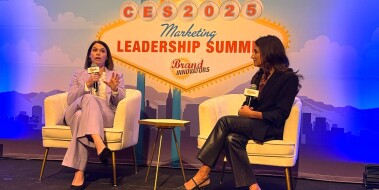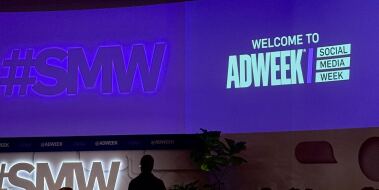Our Blog

Leading Across a Multigenerational Workforce: Turning Generational Differences into Organizational Strength
Today’s leaders are navigating something completely new. For the first time in history, five generations are working side by side. Each group arrived in the workplace shaped by the cultural moments, technologies, and social norms of their era—broad patterns that often influence how people communicate, solve problems, adopt new tools, and approach collaboration.
December 10, 2025

Behind the Message that’s Helping Health Care Professionals Talk About Firearm Safety
Driving meaningful change among health care professionals (HCPs) requires more than compelling creative—it demands deep empathy, strategic precision and a genuine understanding of their daily realities. That’s the approach behind the latest from the Ad Council’s “Agree to Agree” campaign, to craft messaging that empowers HCPs to initiate life-saving conversations about firearm safety with patients and their families.
October 23, 2025

Ending Hunger, One TikTok at a Time
Every day, Americans spend an average of a movie's worth of time on TikTok. What if even a fraction of that time could be used to help end hunger? That’s the question we asked when we partnered with TikTok and Feeding America for Hunger Action Month.
October 23, 2025

How Creator Content Is Accelerating the Shift to Skills-First Hiring
Skills-First Hiring is reshaping how we think about talent, and creator content is helping accelerate that shift. At the Ad Council, we believe the messenger is just as important as the message—and through Creators for Good, our in-house talent engagement arm, we continue to innovate and redefine the role creators and trusted messengers play in our industry.
October 20, 2025

What Makes a Great Creative Platform? Insights from Celebrating 80 Years of Smokey Bear
In 1944, the USDA Forest Service, National Association of State Foresters and Ad Council launched the first poster featuring Smokey Bear. This national wildfire prevention awareness campaign asked Americans to take personal responsibility and do their part to help prevent unwanted wildfires.
August 8, 2025

Reflections on Cannes and Cause-Oriented Campaigns from Inaugural Young Lions Bold Impact Winners
Each year, the Cannes Lions International Festival of Creativity brings together leaders in advertising, communications and media to showcase award-winning work, advance global conversations and inspire new avenues for creativity. Alongside seasoned CMOs, rising stars of the industry are also making their mark.
July 3, 2025

Listen Up: How Audience Insights Strengthened Our Alzheimer's Awareness Campaign (and Can Help Yours Too)
More than seven million Americans are living with Alzheimer’s or other dementias. According to new data from the Alzheimer’s Association, that number is expected to increase significantly as the senior population in the United States continues to grow. It's a devastating disease, one that touches many of us personally. At the same time, we’re seeing that brain health is a rapidly growing area of interest, as more research becomes available and breakthrough early diagnostic tests and treatments for diseases like Alzheimer's emerge.
June 11, 2025

Reaching Distinct Audiences with Tailored Mental Health Campaigns
In November 2022, the Ad Council unified new and existing mental-health-focused campaigns under a cohesive Mental Health Initiative with the goal of creating a society that is more open and proactive when it comes to mental health. Now, for this May’s Mental Health Awareness Month, we are exploring the ways in which the campaigns that make up this initiative have utilized distinct tactics and messaging to get mental health resources to the communities who need them, while working in tandem to address the issue holistically.
May 15, 2025

Can Purpose Driven Marketing Save the Creator Economy? (Spoiler: Yes!)
The creator economy is in flux, but when has it not been?
May 8, 2025

Supporting Veterans: The Impact of the "Don't Wait. Reach Out." Campaign on Suicide Prevention
Veterans, whether they recently transitioned to civilian life or have been out of the military for years, face unique challenges that can impact their well-being. This is why Veteran suicide prevention is a key focus area within the Ad Council’s Mental Health Initiative.
April 28, 2025

Launching on Roblox: Insights from the "Love, Your Mind World"
On March 5th, the Ad Council launched the Love, Your Mind World on Roblox—the first nonprofit experience dedicated to supporting teen mental health on the platform. Developed with guidance from leading mental health experts, this immersive world was designed to meet teens where they already are spending their time, while equipping them with valuable mental health resources in a safe and engaging environment. The new experience is available at www.roblox.com/loveyourmind. You can view a trailer video here.
April 4, 2025

“Agree to Disagree” Ends a Conversation on Gun Violence. “Agree to Agree” Starts One.
One year ago, we announced the launch of the Ad Council’s Gun Violence Prevention Initiative—an expansion of our long-time commitment to address this health crisis. This multi-faceted effort was designed to support the life-saving work already happening across this space. We knew then what remains true today: no one organization or individual can address this crisis alone.
April 2, 2025

Innovation, Impact and Serendipity: SXSW 2025 Through the Lens of Emerging Tech and Creativity
SXSW is always an energizing experience—a melting pot of creativity, technology and collaboration where some of the most meaningful conversations happen in the most unexpected ways. This year was no different. Over three whirlwind days in Austin, I had the opportunity to speak on two thought-provoking panels, engage in insightful discussions with industry leaders, and immerse myself in groundbreaking activations that showcased the future of gaming, AI and immersive storytelling.
March 14, 2025

Innovation and Urgency: CES 2025 in the Shadow of the California Wildfires
As I reflect on my experience at CES, I know that this year is one I’ll never forget.The groundbreaking technology I encountered and the inspiring conversations I had were all taking place while the devastating wildfires swept through Los Angeles, in my home state of California. At the time I’m writing this, the fires remain uncontained, destroying over 57,000 structures and forcing the evacuation of more than 153,000 residents. Needless to say, this cast a somber undertone over CES–many attendees, including several of my colleagues, were personally impacted and had to fly out to support their families.
January 13, 2025

Join Us for Advertising Week New York 2024
Get ready for Advertising Week New York, where the brightest minds in the industry come together to push boundaries and explore the future of marketing, media and tech. This year, we’re proud to participate in two dynamic panels that highlight the power of creative storytelling and how we’re shifting perceptions around the most critical issues of our time.
September 26, 2024

Advertising for Good: Shaping the Future of Mental Health at Smartly Advance
At the Ad Council, the phrase “advertising for good” isn’t just a tagline—it’s the core of everything we do. This concept resonates deeply across our industry, and we’re fortunate to collaborate with some of the most innovative platforms that share our commitment to leveraging advertising for positive change. To bring this topic to life, Ad Council’s President and CEO, Lisa Sherman, and Smartly CEO, Laura Desmond, will lead a panel called, “Advertising for Good” at Smartly Advance.
September 5, 2024

Cannes Lions 2024: A Week of Inspiration, Learning and Connections
My first experience at the Cannes Lions International Festival of Creativity was nothing short of transformative. Imagine the energy of a music festival combined with the intellectual stimulation of an academic conference, all set against the backdrop of the stunning French Riviera. Major agencies, brands, tech and social media companies build pop-up activations along the beach—creating an atmosphere buzzing with creativity and innovation.
June 24, 2024

Get in the Game: Engaging Gen Z Gamers through Fan Favorites
Establishing an authentic connection with target audiences can be a game-changer in delivering nuanced critical messages. Together, with our partners, we took this approach in a recent collaboration to reach young adults. By tapping into the existing level of trust in the video gaming community, we were able to create genuine connections and share important mental health resources. Join us for a deep dive as we discuss how Gen Z, a generation deeply immersed in gaming culture, found value in the authenticity of our message and how we engaged them using some unique trusted messengers.
May 23, 2024

From Awareness to Action: Leveraging WebAR for Social Impact
As the vice president of emerging media and technology at the Ad Council, I’m always exploring new and emerging technologies that can help drive impact across our many social cause campaigns. I was eager to explore web-based augmented reality (WebAR) as a way to reach people with our messages and after months of building, we just launched our first WebAR partnership with our long time partners at Feeding America. For those of you unfamiliar with this technology, WebAR enables users to interact with digital graphics superimposed onto their real world environment through a web browser, without the need for a dedicated app. The user gets to this experience through scanning a QR code or tapping through to a website. This accessibility makes WebAR a powerful tool for marketers, enabling a broad audience to seamlessly access the experience across various devices. The immersive nature and gamification of a WebAR experience can boost engagement, making complex messages more resonating and impactful.
May 15, 2024

How the Creator Economy is Driving Social Impact
Last June, in partnership with Whalar, the Ad Council’s Creators for Good team–our premier in-house talent engagement arm–launched an Ambassador Pilot Program to foster deeper connection with multi-hyphenate content creators passionate about social impact.
May 9, 2024

The 7 Most Talked-About Moments from Social Media Week
In the ever-evolving social media landscape, staying ahead of the curve isn't just a goal—it's a necessity. From social media managers leading day-to-day operations to CMOs directing marketing strategy, brands understand that to stay relevant they must make an investment in social. And events like AdWeek’s Social Media Week are crucial for keeping brands at the forefront of industry trends and innovations.
April 18, 2024

Champion for Good: Mike Durham
Peachjar is a platform that is revolutionizing the way students access community resources and important initiatives. Through their partnership with the Ad Council, Peachjar has extended the reach and impact of campaigns, providing parents and students with valuable information on a variety of topics. We had the opportunity to chat with Peachjar’s CEO and Founder Mike Durham to learn about the importance of accessible student resources, his focus on students’ mental health and emotional-wellbeing, and insights on how to beat a chess master.
April 15, 2024

Gun Violence Is Now a Public Health Crisis
At the Ad Council, we always say we can’t possibly pick a favorite campaign—just like we can’t pick a favorite child. But sometimes an issue just gets inside you. You see that statistic, you see that headline, and your reaction isn’t just intellectual. It’s not even just emotional. It’s visceral. You feel it twisting in your gut. And as a mother, you feel it in your heart.
March 19, 2024

The Impact of Trusted Messengers on Marketing Strategies
In a post-COVID world, the creator economy is a reinvigorated space. Traditionally, messaging around sensitive topics like mental health, public health and gun safety were shared out by health organizations, government agencies or other trusted institutions. Today, influencers play a vital role in sharing important messages and driving meaningful change—reshaping how marketers partner with trusted messengers to address key social issues. Now more than ever, nano to celebrity influencers play a pivotal role in shaping online conversations and creating impact.
March 13, 2024

The Magic of Leading with Purpose: A HOW Conversation about Leadership with Lisa Sherman and Dov Seidman
We are in a time where unprecedented forces are reshaping our world faster than we can adapt our institutions, leadership and even ourselves. In recent years, we have faced challenges on all sides—a global pandemic causing suffering, death and economic destabilization; a reimagined workplace; technological advances that challenge human dignity and autonomy; a war in Ukraine and Israel that has shaken international alliances; and the rise of autocratic leaders across the globe.
February 5, 2024

Tech Trends with a Purpose: Key Takeaways from CES for Marketers and Social Impact Leaders
As the vice president of emerging media & technology at the Ad Council, I always look forward to attending CES, the most influential tech conference in the world—attracting over 3,000 exhibitors and 130,000 attendees, all showcasing breakthrough technologies that will shape our future. I love to learn how technology innovations are not only shaping the marketing industry, but most importantly solving the biggest challenges in our world today. Below are some of my key takeaways from 2024.
January 17, 2024

Stories from Detroit: How JPMorgan Chase Showcased a City’s Remarkable Comeback
“Detroit’s story is one of the greatest comebacks of all time,” says Jamie Dimon, Chairman and CEO of JPMorgan Chase. “Having served the city for more than 90 years, especially after it filed the largest municipal bankruptcy in U.S. history, we’re proud to share the successes and stories of Detroiters who helped make it happen.”
December 4, 2023

Centering Women Veterans in ‘Don’t Wait. Reach Out.’ Campaign
Veterans, whether they've recently left the military or served decades ago, have unique experiences and needs as they adjust to civilian life. They may struggle with challenges related to their service or face common stressors like physical or mental health challenges.
November 20, 2023

A Deep Dive on Our Substance Use and Overdose Crisis Work
In the United States, drug overdose deaths reached nearly 108,000 in 2021, the highest number ever recorded in a 12-month period and a staggering 52% increase compared to two years prior. Over the past 21 years, drug overdoses have claimed more than 932,000 lives. In addition, in 2021, 46.3 million people aged 12 or older in our country had a substance use disorder (SUD). However, less than 10% of these individuals report receiving care or treatment for their substance use.
November 16, 2023

5 Principles to Guide Your 988 Outreach and Messaging Efforts to Key Populations
Warning to the reader: This blog discusses various experiences that you may find yourself identifying with while reading. Should you need emotional or mental health-related support, please contact 988 or a local trusted support.
November 15, 2023

2023 Industry Takeaways from Advertising Week New York
Last week, we participated in Advertising Week New York (AWNY), an annual conference that unites the brightest minds in marketing, advertising, media and technology. The conference presented a remarkable opportunity for us to engage with industry experts and witness our own leaders and Board members address several pressing issues affecting the nation. Join us for a recap of AWNY, where we'll examine the key insights and creative innovations reshaping our industry, including the four pivotal themes that emerged.
October 25, 2023

Where to Find Ad Council During Advertising Week New York 2023
Join us for Advertising Week New York, the premier event for industry leaders to discuss and explore the latest trends, innovations and challenges in marketing, advertising, media and tech. As industry leaders gather, virtually and in-person, we are excited to host three engaging panels and feature our award-winning “Tear the Paper Ceiling” installation. Our experts will join key leaders to discuss harnessing creativity for impact and changing the narrative around substance use disorders.
October 11, 2023

Amazon's Creative Director Uses Music and Tech to Address Youth Mental Health
Go behind-the-scenes with Sara Wald, Creative Director at Amazon, as we delve into our collaboration to develop a powerful new resource focused on supporting the youth. Our interactive experience, "When You Can't Say It, Play It," serves as a tool for parents and caregivers to initiate conversations with teens through music. By leveraging technology to drive impact and connection, Amazon and the Ad Council are actively working to find new ways to address mental health and wellness. Gain insight as Sara shares the inspiration behind the experience, the impact of music on youth mental health, and the need for inclusive marketing.
September 28, 2023

Advancing Healthy Aging Initiatives and Alzheimer's Awareness in Hispanic Communities
In the Hispanic community, distinguishing between the natural process of aging and the early signs of Alzheimer's disease can be difficult to recognize. Healthy aging is a universal goal that transcends cultural boundaries and can take on various forms within different communities.
September 21, 2023
